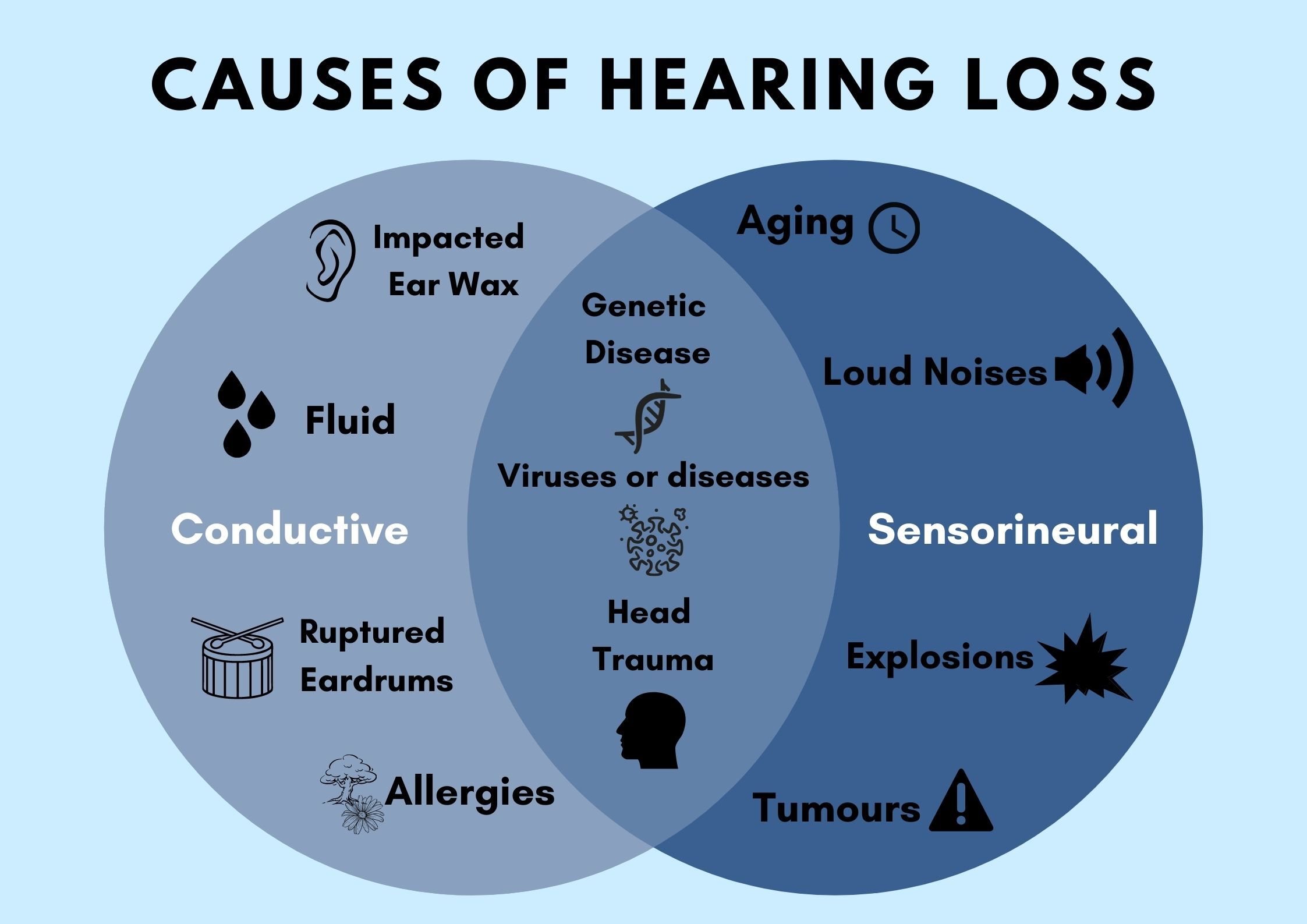Sometimes, life throws a spanner in the works. Even with excellent audiology care and top-tier hearing aids, you might still experience a sudden drop in hearing. This condition is known as Sudden Onset Hearing Loss (SOHL).
The signs are familiar to many: tinnitus flares up, TV dialogue sounds distant, and conversations become harder to follow. You may feel yourself drifting in and out. High-pitched sounds are usually the first to go. For example, ‘f’ may sound like ‘s’, and morning birdsong fades into a quiet hum.
SOHL can happen unexpectedly. It’s a serious condition that affects people of all ages—regardless of past hearing issues.
What are the types of sudden hearing loss?
Sudden Onset Hearing Loss can be subdivided into three broad classifications: Sudden Sensorineural Hearing Loss (SSHL), Conductive Hearing Loss (CHL) and Mixed Hearing Loss (MHL). So, what do each of these entail?
Sensorineural Hearing Loss
‘Sensorineural’ (sensory + neural) refers to damage caused to the inner ear and auditory nerves, particularly against the sensory nerve and its neural circuitry. There can be a multitude of causes for why this might happen (which will be discussed later).
Conductive Hearing Loss
Inside the ear is a pathway from the outer ear to the eardrum to the middle ear. CHL occurs when sound waves do not transfer correctly along this route.
Mixed Hearing Loss
As the name suggests, this combines both sensorineural and conductive damage. It may affect the entire ear structure and auditory nerve.
Each of these sets of conditions comes with its own attendant causes and symptoms. Sometimes, something as simple as earwax build-up can have a huge knock-on effect if left untreated, resulting in one of the above outcomes. Let’s delve into some of the root causes of these effects.
What Causes Sudden Hearing Loss?
Impacted Wax
Earwax builds up naturally, but if it doesn’t exit the ear, it can harden. This leads to impaction—blocking sound and potentially damaging the ear canal. You can read more about earwax removal here.
Infection
Each of the aforementioned areas of the ear is, unfortunately, susceptible to infection by bacteria, fungi or viruses. For a more detailed explanation, why not check out this blog by one of our resident audiologists, Rosie Dooley.
Head Trauma
Sudden violent injury can be another major cause of Sudden Onset Hearing Loss; always make sure that if you’ve had a fall or taken a knock that you disclose this information to your GP or audiologist as it can make your diagnosis that much quicker.
Neurological Disorders
Conditions like Multiple Sclerosis and Auditory Neuropathy may interfere with hearing. Auditory Neuropathy disrupts how the inner ear transmits sound to the brain.
Ménière’s Disease
A complex disorder of the inner ear marked by its episodic periods of vertigo, tinnitus and hearing loss, the cause of Ménière’s disease is not fully understood but can be hereditary in about 10% of cases.
Pharmaceutical Drugs
Certain household drugs like antibiotics, pain relievers like aspirin and some diuretics may cause short-term hearing loss as a side effect. More exotic fare such as Quinine (used for malaria), chloroquine (for lupus) and hydroxychloroquine, which was approved in the US in 2020 as an emergency treatment for the coronavirus, are also noted to have unpredictable after-effects.
Blood Circulation Issues
Restricted blood flow to the inner ear can also cause problems in the long term; as such, you should always be mindful of any underlying conditions which may affect blood pressure.
Tumours
Growths around the head or neck can have particularly adverse effects on hearing. One example of this is the acoustic neuroma, a benign (non-cancerous) tumour that develops on the main nerve leading from your inner ear to your brain.
What Should You Do?
Most causes of sudden hearing loss are treatable—but early action is key.
In many cases, adjusting your hearing aid can help. But in others—like tumours—you’ll need immediate medical intervention.
If you or someone you know suddenly loses hearing, speak with a GP or audiologist straight away. Quick action could mean the difference between temporary and permanent hearing loss.







